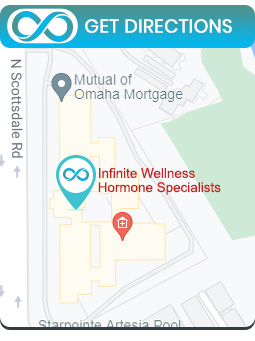Urinary Incontinence Treatment in Scottsdale, AZ
Urinary incontinence is a common condition that affects many people, impacting their daily lives and overall well-being. At Infinite Wellness Hormone Specialists, Dr. Vanessa Mack (Dean), a board-certified doctor, offers comprehensive treatment designed to improve bladder control and enhance quality of life. Our approach includes personalized evaluations to identify the underlying causes, whether related to hormonal imbalances, age, or other health conditions. Contact us today for more information or schedule an appointment online. We are conveniently located at 7373 N Scottsdale Road, Suite C140, Scottsdale, AZ 85253.


Table of Contents:
What is urinary incontinence?
What causes urinary incontinence?
When should I see a doctor for urinary incontinence?
Who is at risk for urinary incontinence?
Urinary incontinence is the involuntary loss of urine, a common condition that can significantly impact a person’s quality of life. While it can affect individuals of all ages, it is especially prevalent among women and older adults. Hormonal changes and imbalances, such as those associated with aging, can contribute to urinary incontinence by weakening the pelvic floor and impacting bladder function.
There are several types of urinary incontinence, including stress incontinence, which causes leakage during activities like coughing or exercise due to weakened pelvic muscles; urge incontinence, marked by a sudden, intense need to urinate; overflow incontinence, which occurs when the bladder doesn’t empty; and functional incontinence, where individuals struggle to reach the bathroom due to physical or cognitive limitations. Hormonal fluctuations, deficiencies, and endocrine disorders can all play a role in the development and severity of incontinence symptoms.
At Infinite Wellness Hormone Specialist, our team is dedicated to identifying and addressing the root causes of your urinary incontinence. We offer comprehensive hormone evaluations and personalized treatment plans that may include hormone replacement therapy and lifestyle modifications tailored to your needs. If you are experiencing urinary incontinence, don’t let embarrassment prevent you from seeking help. Our expert providers can help you regain control and improve your quality of life.
Urinary incontinence, or the involuntary loss of bladder control, affects millions of men and women and can significantly impact quality of life. At Infinite Wellness Hormone Specialist, we understand that hormonal imbalances—often overlooked—can play a crucial role in the development and management of urinary incontinence.
Causes of urinary incontinence are:
• Weakened Pelvic Floor Muscles: Caused by aging, pregnancy, or childbirth, leading to reduced bladder control.
• Hormonal Changes: Reduced estrogen during menopause can weaken pelvic muscles and affect bladder function.
• Neurological Disorders: Conditions like multiple sclerosis or Parkinson’s disease can interfere with bladder control.
• Urinary Tract Infections: Can cause temporary incontinence or contribute to long-term issues.
• Prostate Problems: In men, prostate enlargement or related conditions can affect bladder function.
• Obesity: Increased weight puts pressure on the bladder, contributing to incontinence.
• Diabetes: Can lead to nerve damage, affecting bladder control.
• Medications: Some drugs, like diuretics, can increase the risk of incontinence.
• Lifestyle Factors: Excessive caffeine or alcohol consumption can irritate the bladder and trigger incontinence.
At Infinite Wellness Hormone Specialists, we take a comprehensive approach to urinary incontinence. If you are experiencing urinary incontinence, our expertise in hormone health can help you find lasting solutions tailored to your unique needs.
If you’re experiencing urinary incontinence, it’s important to consult a doctor, especially if the symptoms begin to affect your daily life. Seeking medical advice is essential to identify the underlying cause and determine the best treatment options. Urinary incontinence can be linked to various health conditions, and a healthcare professional can help pinpoint the cause and suggest appropriate solutions.
You should see a doctor if your symptoms worsen, become more frequent, or interfere with daily activities. It’s also important to seek medical attention if you notice blood in your urine, experience pain during urination, or have other health concerns like diabetes or neurological conditions that could be contributing to the issue. A doctor can help assess your condition and provide tailored treatment to manage urinary incontinence effectively.
At Infinite Wellness Hormone Specialists, discussing urinary incontinence with our team can help identify the underlying cause. Dr. Vanessa Mack (Dean) offers comprehensive evaluations and personalized treatment plans, including hormone optimization, to help you regain control and improve your quality of life.
Urinary incontinence is a common issue that can affect individuals of all ages, but certain factors can increase the risk. Hormonal changes, such as those that occur during pregnancy, postpartum, and menopause, can weaken pelvic floor muscles, leading to bladder control issues. In older adults, bladder and urethral muscles naturally weaken with age, and hormonal shifts can exacerbate these changes.
Other risk factors include excess weight, which puts additional pressure on the bladder, and chronic conditions like diabetes or neurological diseases such as Parkinson’s or multiple sclerosis, which can disrupt nerve signals involved in bladder control. Men may experience incontinence due to prostate surgery or hormonal changes affecting prostate health. Certain medications, such as diuretics and muscle relaxants, can also increase the likelihood of incontinence. Additionally, individuals with limited mobility or cognitive challenges may struggle to reach the bathroom in time, further raising their risk.
At Infinite Wellness Hormone Specialist, we take a holistic, personalized approach—evaluating your unique hormone profile, lifestyle, and health status to identify the underlying contributors to urinary incontinence. Our goal is to restore wellness, improve the quality of life, and empower you with effective solutions. Contact us today for more information or schedule an appointment online. We are conveniently located at 7373 N Scottsdale Road, Suite C140, Scottsdale, AZ 85253. We serve patients from Scottsdale AZ, Tempe AZ, Mesa AZ, Paradise Valley AZ, Chandler AZ, Phoenix AZ and BEYOND!

Check Out Our 5 Star Reviews


Additional Services You May Need
▸ Hormone Pellet
▸ Women’s Hormone Therapy
▸ Men’s Hormone Therapy
▸ Semaglutide GLP-1 Injections
▸ Women’s Intimate Health
▸ Body Contouring
▸ Thyroid Conditions
▸ Adrenal Health
▸ Menopause
▸ Medical Weight Loss
▸ Contour Light
▸ Morpheus 8
▸ Red Light Therapy

Additional Services You May Need
▸ Hormone Pellet
▸ Women’s Hormone Therapy
▸ Men’s Hormone Therapy
▸ Semaglutide GLP-1 Injections
▸ Women’s Intimate Health
▸ Body Contouring
▸ Thyroid Conditions
▸ Adrenal Health
▸ Menopause
▸ Medical Weight Loss
▸ Contour Light
▸ Morpheus 8
▸ Red Light Therapy








